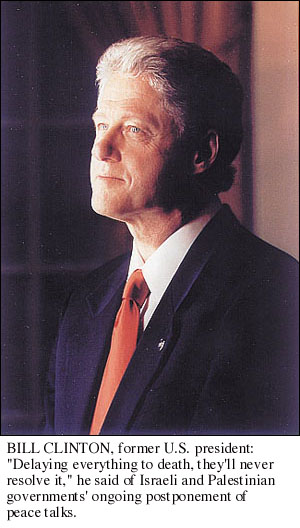
Clinton, making his first visit to Winnipeg, quoted a statement by the late Israeli prime minister Yitzhak Rabin for a crowd of about 1600.
"Rabin was right when he said: 'I will negotiate as if there were no terror, and I'll fight terror as if there were no negotiations,'" he said in his address, part of a four-part My Life Our Times celebrity speakers series organized by Jewish Winnipeggers Marvin Meltzer and Jerry Shore. "That's the way it ought to be done. Delaying everything to death, they'll never resolve it."
He commented on the Middle East peace process during a question and answer session, after making an hour-long speech about "global interdependence". Clinton called in that address for more international cooperation to solve world problems, ranging from the situation in Iraq to the Third World AIDS epidemic.
He said more developed countries like Canada and the U.S. can't afford to ignore those problems.
Clinton argued that letting Third World crises fester will breed more angry people there, more likely to turn to terrorism within and beyond their borders.
"We are interdependent in ways that go beyond economics," he said. "The word 'interdependent' means 'we cannot escape each other.'"
Responding at length to a question about how he saw the Israeli-Palestinian conflict being resolved,
Clinton defended the Oslo Peace Process he presided over as president.
"We stumbled along that path with fits and starts for seven years, and it went pretty well," he said, as a large screen behind him projected his image to the crowd. "And finally, I got Barak to accept an offer in 2000 that Arafat turned down - one of the most colossal historical errors in my lifetime."
Clinton said Palestinian Authority President Yasser Arafat later acknowledged that peace offer was a good one.
"A year later, after I was gone, and an Israeli government wouldn't give it to him, and an Israeli public didn't support Arafat, he said: 'I'm in favor of the Clinton peace plan.'"
"Now we have 2300 dead Palestinians, average age 18, and almost 900 dead Israelis, average age 24, because we are simply denying their interdependence," Clinton added. He was referring to the El Aksa intifada Arafat started, after turning down the peace offer Clinton and then-Israeli prime minister Ehud Barak made to him at Camp David two months earlier.
Clinton offered a lefthanded compliment for the Geneva Accord signed last December by Israeli and Palestinian moderates who no longer hold office.
"They took my last best offer and just filled in the blanks," he said of the accord, which offers a detailed plan for how even the most difficult issues in the Israeli-Palestinian conflict can be resolved.
Clinton said the accord, which spells out how Jerusalem can be divided, and the Palestinian refugee issue settled, shows "Palestinians and Israelis can actually make the decisions on these kinds of issues."
Eventually, he added, "like it or not, they're going to have to share the future. They're going to have to share that small piece of land and Jerusalem, they're going to have to share security responsibilities."
"They're going to have to share economic benefits, and the rest of us are going to have to help them bear the costs of relocating and compensating the refugees."
The Palestinians, in turn, will have to give up the idea of an "unlimited right of return", and return to a "Palestinian state", with "ample compensation for the refugees".
Israel will have to stop "expanding settlements" in the occupied territories, give up "most of the West Bank", and compensate settlers forced to leave.
Clinton acknowledged that Israel "can survive" without a peace agreement, "because we won't let them die."
He predicted, however, that "their lives will be unhappy and insecure and more twisted if they just go on and leave things be."
denying their interdependence," Clinton added. He was referring to the El Aksa intifada Arafat started, after turning down the peace offer Clinton and then-Israeli prime minister Ehud Barak made to him at Camp David two months earlier.
Clinton offered a lefthanded compliment for the Geneva Accord signed this month by Israeli and Palestinian moderates who no longer hold office.
"They took my last best offer and just filled in the blanks," he said of the accord, which offers a detailed plan for how even the most difficult issues in the Israeli-Palestinian conflict can be resolved.
Clinton said the accord, which spells out how Jerusalem can be divided, and the Palestinian refugee issue settled, shows "Palestinians and Israelis can actually make the decisions on these kinds of issues."
Eventually, he added, "like it or not, they're going to have to share the future. They're going to have to share that small piece of land and Jerusalem, they're going to have to share security responsibilities."
"They're going to have to share economic benefits, and the rest of us are going to have to help them bear the costs of relocating and compensating the refugees."
The Palestinians, in turn, will have to give up the idea of an "unlimited right of return", and return to a "Palestinian state", with "ample compensation for the refugees".
Israel will have to stop "expanding settlements" in the occupied territories, give up "most of the West Bank", and compensate settlers forced to leave.
Clinton acknowledged that Israel "can survive" without a peace agreement, "because we won't let them die." He predicted, however, that "their lives will be unhappy and insecure and more twisted if they just go on and leave things be."
Get in-depth news from Winnipeg's Jewish community, Israel and the Jewish world, including eight color pages every week at the lowest rate for any Canadian Jewish weekly. Just click here to subscribe to The Jewish Post & News now for the introductory rate of only $25 per year for Canadian residents (new subscribers only), or $60 U.S. per year for residents of the U.S. and other countries.
Click here for more older Jewish Post & News stories.